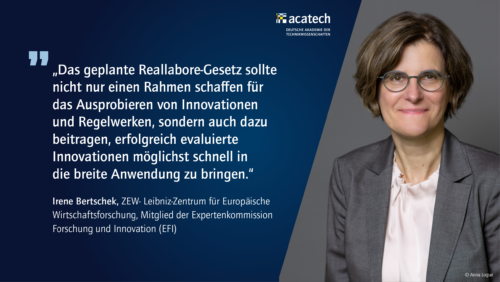Reallabore-Gesetz (legislation for regulatory sandboxes): new opportunities for international competitiveness and faster innovations

Munich, 22 June 2023
Regulatory sandboxes are environments where products and rules are tested and co-developed. They make it easier or, in some cases, possible in the first instance to scale groundbreaking innovations and, at the same time, they present an opportunity to optimise the legislation. The paper “Driving innovation with regulatory learning: suggestions on the formulation of the Reallabore-Gesetz,” edited by Martin Brudermüller and Irene Bertschek, sets out guidelines for the drafting of the German federal government’s proposed legislation for regulatory sandboxes.
There must be scope for new technologies to be tested and further developed. At the same time, practical experience from real-life application is required to regulate new technologies in a way that is tailored to them and encourages innovation. Regulatory sandboxes provide testing environments for new technologies and regulatory learning: science and business can field-test innovations while the government can follow the process and adapt the legal framework to new findings with agility.

For Germany and Europe to hold their own in the international competition among systems, they must get faster at translating innovations from research to practice. The federal government’s proposed Reallabore-Gesetz, which establishes a national framework for regulatory sandboxes that encourages innovation – and thus creates scope to try out innovations – can significantly boost future competitiveness.
While conversations about technology in Germany and Europe have often been overly focused on risk, regulatory sandboxes can gauge the risks and opportunities in a concrete setting closely aligned to the regulations and thus lay the foundations for acceptance. In this regard, the government can ensure that innovations are tested in a free yet controlled environment that does not pose any risks to society but without hindering technological innovation and holding up society’s progress.

The paper “Driving innovation with regulatory learning: suggestions on the formulation of the Reallabore-Gesetz” contains recommendations for action in relation to the proposed German legislation for regulatory sandboxes. It underscores the potential and the urgent need for the legislation in light of current and future initiatives that, absent legal certainty, cannot be realised in time or at all or can be realised faster in a different market. Germany should therefore pass the proposed Reallabore-Gesetz quickly and also make the case for the effective use of the instrument at European level as well.




